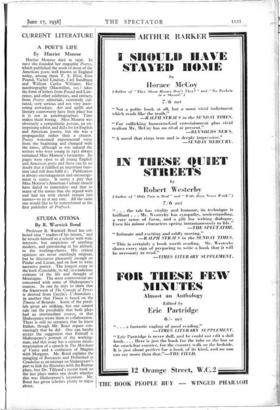CURRENT LITERATURE
Harriet Monroe died in 1936. In 1912 she founded her magazine Poetry, which published the work of most of the American poets well known in England today, among them T.. S. Eliot, Ezra Pound, Vachel Lindsay, Carl Sandburg and William Carlos Williams. Her autobiography (Macmillan, 21s.) takes the form of letters from Pound and Law- rence, and other celebrities, and extracts from Poetry editorials, extremely cul- tured, very serious and not very inter- esting nowadays. Art and uplift and literary controversy have their place but it- is not in autobiographies. Time makes them boring. Miss Monroe was obviously a sympathetic person, an en- terprising editor, and did a lot for English and American poetry, but she was a propagandist rather than a creator. Poetry welcomed experimental verse from the beginning and changed with the times, although as was natural the writers who were young in 1912 always remained Miss Monroe's favourites. Its pages were open to all young English and American poets and there can be no doubt that it fulfilled an important func- tion (and still does fulfil it). Publication is always encouragement and encourage- ment is scarce. It seems a pity that Miss Monroe's American Culture should have failed to materialise and that so many of the names that she argued with and had tea with should remain just names—to us at any rate. All the same one would like to be remembered as the first publisher of Prufrock.


















































 Previous page
Previous page